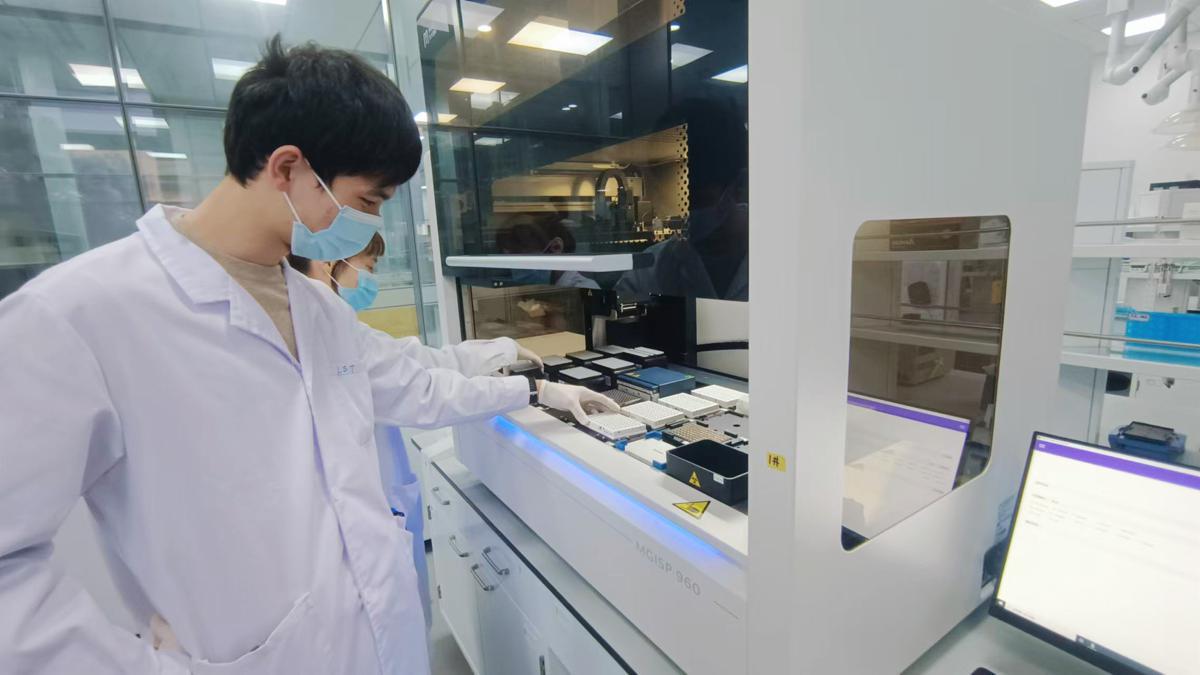
今日上海
中国将与世界分享其生物银行 - 2024年11月26日
China to share its biobank with world

Medical researchers on the China Metabolic Analytics Project work in a lab.
In a landmark announcement by Shanghai's Ruijin Hospital, the China Metabolic Analytics Project revealed its decision to open its biobank to the world after two decades of accumulation.
The move came ahead of World Diabetes Day, which fell on Nov 14. Ruijin Hospital aims "to join hands with fellow medical workers from around the world to work together to tackle challenges from metabolic diseases and tumors and contribute to human health as a whole", said Ning Guang, president of the hospital and academician with the Chinese Academy of Engineering.
ChinaMAP, jointly spearheaded by the National Clinical Research Center for Metabolic Diseases at Ruijin and a number of research institutions and hospitals nationwide, is a comprehensive cohort study project spanning the country.
A cohort study is one in which a group of people are observed over a period of time to form a health analysis.
The project's mission is to gather energy metabolism experts from home and abroad to delve into the mechanisms of energy metabolism and metabolic imbalances leading to diseases, while seeking methods to maintain metabolic homeostasis.
While genomic discoveries in Europe and the United States have led the way in molecular epidemiology, complex diseases and the identification of genetic mechanisms, markers and related drug targets, the genetic backgrounds and characteristics of Chinese and Western populations differ significantly.
Hence, China must have its own genome analysis initiative. That inspired the team at Ruijin, which is affiliated with Shanghai Jiao Tong University School of Medicine, to initiate ChinaMAP based on China's natural population and disease patients.
After conducting five distinct clinical and population studies, ChinaMAP established the M-Biobank, a repository of metabolic disease biological samples from nearly 3 million people.
The samples come from 150,000 participants from a national diabetes survey; 200,000 from a national cohort study regarding cardiovascular metabolism and malignant tumors; 2.5 million from the National Metabolic Management Center; 3,600 from a national cohort study involving adolescents with severe obesity; and 12,000 from a blood pressure target study for adults with Type 2 diabetes.
The first phase of ChinaMAP covered 27 provincial-level regions and eight ethnic groups nationwide, having established the most comprehensive genomic database in China to date.
For instance, the national cohort study regarding cardiovascular metabolism and malignant tumors initiated by Ruijin Hospital's endocrinology team was a multi-center prospective, longitudinal follow-up study in natural population. It was aimed at deepening the understanding of risk factors for diabetes, cardiovascular diseases, tumors and all-cause mortality.
Wang Weiqing, director of the department of endocrine and metabolic diseases at Ruijin Hospital, said that the biobank has accumulated impressive resources, including those in genomics, proteomics, metabolomics and gut microbiomes.
"It has gathered data on over 1,500 diseases and phenotypes, with follow-ups spanning more than a decade," Wang said.
"Based on data from the biobank, a top platform in Asia for scientific research in this regard in terms of the number of people involved, statistics from the follow-up duration and data quality and quantity, are expected to emerge within five years," she said.
Source: China Daily

